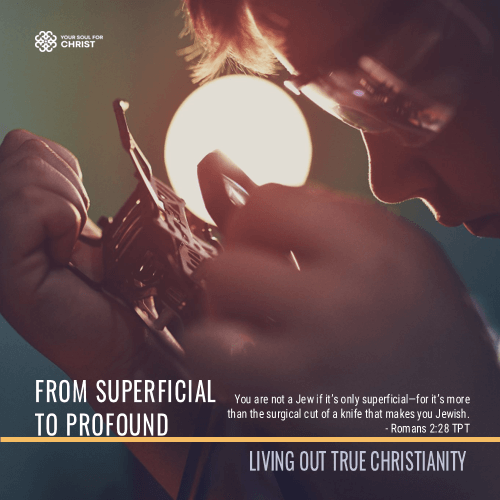You are not a Jew if it’s only superficial—for it’s more than the surgical cut of a knife that makes you Jewish.
Romans 2:28 TPT
When you fill out a form, there is sometimes a segment for religion. That means there is a choice to be made in the faith you practice. However, it is more than going to church that makes you a Christian. You are not a Christian because you belong to a family that is named with Christ. Faith is an internal transformation, not a mere external affiliation. It is not superficial.
Let us take a look at Paul (formerly known as Saul). He was a devoted Jew, but not a Christian. He was zealous in carrying out religious activities, yet he was not a Christian. The Christian title is now common without the people living that life. There are different synonyms and appellations associated with being a Christian that are now trivial. There are a lot of Jesus ‘lovers’, they claim to love but deny His ways.
In today’s world, identifying as a Christian has become a cultural label for many. People often inherit the title from their families or communities without truly embracing the profound change that being a Christian entails. This superficial approach to faith is akin to wearing a badge without embodying the principles it represents.
Being a Christian requires more than attending church services or participating in religious activities. It demands a deep, personal relationship with Christ, transforming your heart and mind. It begins with repentance and receiving the gift of righteousness through faith in Christ Jesus. Consequently, it is living out His teachings daily, not just when it is convenient or visible to others. True Christianity is seen in the way we love, forgive, and serve others, reflecting Christ’s love in our actions.
Furthermore, the Christian journey is one of continuous growth and reflection. It involves daily commitment and sacrifice, choosing to follow Christ’s path even when it goes against our natural inclinations or societal norms. This is not a passive state of existence but an active, dynamic process.
Paul’s transformation is a perfect illustration of this profound change. Once a fervent persecutor of Christians, Paul’s encounter with Christ on the road to Damascus led to a radical shift in his beliefs and actions. He did not merely adopt the Christian label; he lived it out through his missionary journeys, his letters, and ultimately his martyrdom. Paul’s life exemplifies the depth of commitment and transformation that true Christianity requires.
Moreover, in our current age, where societal values are constantly shifting, it is even more crucial for Christians to embody their faith authentically. The world needs to see Christians who do not just speak about love, kindness, and holiness, but who live these values every day. Our actions should align with our words, providing a consistent witness to the transformative power of Christ.
Also, it is essential to understand that true Christianity is about living the life of Christ; and becoming like Jesus. It is about consistently striving to align our lives with Christ’s teachings, recognising our shortcomings, and seeking His grace to overcome them. This humility and reliance on God’s grace are what set true Christians apart from those who merely carry the title.
In conclusion, being a Christian is far more than a superficial label or a set of inherited practices. It is a profound, ongoing journey of transformation and commitment to living out Christ in every aspect of our lives. Let us strive to be Christians in the truest sense, allowing our faith to permeate our actions, and reflecting Christ’s love to the world around us. This, indeed, is the essence of true faith.
